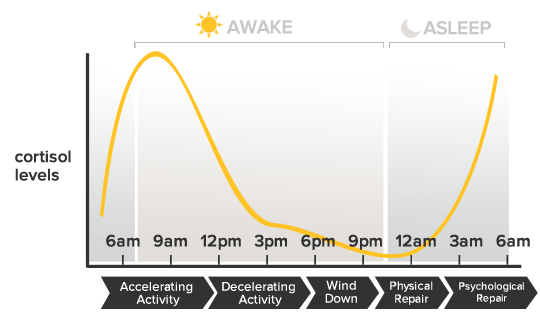The adrenals are 2 small glands that sit on top of the kidneys and pack a powerful punch. They are the main engines of stress management in the body. They also manage blood sugar, produce sex hormones, manage blood pressure and affect salt and water metabolism.
There are two components to the adrenal glands: the cortex and the medulla. The adrenal cortex is where the main adrenal hormones related to stress management are produced (cortisol, DHEA, pregnenolone).
Key terms:
Cortisol-Produced in the adrenal medulla cortisol is responsible for energy and sugar metabolism in the body. It is our main stress response hormone. When people talk about the adrenals the main hormone they are talking about is cortisol. Acts as an immune modulator and anti-inflammatory throughout the body.
DHEA-sex hormone precursor produced in the adrenal cortex.
Pregnenolone-”Mother hormone” of the adrenals. It’s the precursor to all other adrenal hormones.
Addison’s Disease-Disease of not enough cortisol
Cushing’s Disease-Disease of too much cortisol
Functional HYPOcortisolism, aka adrenal insufficiency aka “Adrenal fatigue”-Not enough cortisol, but not fully Addison’s. Not fully recognized as a medical diagnosis.
Functional HYPERcortisolism-Too much cortisol, but not fully Cushing’s. Not fully recognized as a medical diagnosis.
In healthy people cortisol spikes in the morning, waking us up for the day. Then in the afternoon cortisol drops, making way for sleep. Cortisol and melatonin have an inverse relationship. As cortisol begins to wane during the day melatonin picks up to make way for sleep.
People who run on a lot of constant stress can have elevated levels of cortisol for extended periods of time. They can start exhibiting symptoms of functional hypercortisolism which are similar to Cushing’s disease-weight gain, hair loss, high blood pressure, elevated blood sugar, insomnia, fatigue, depression, brain fog.
After a while their adrenals begin to falter and can’t keep up with the level of demand that the stress is putting on the body. Their adrenals then begin to tank and cortisol levels drop. This is when people can start exhibiting symptoms of functional adrenal insufficiency or “Adrenal fatigue”. Along with a drop in cortisol these patients may also experience a drop in DHEA and Pregnenolone. The symptoms of adrenal fatigue are similar to Addison’s disease:fatigue, lightheadedness, brain fog, loss of appetite, low blood pressure, low blood sugar, water-electrolyte imbalance, or sweating.
By the time patients seek professional help the majority are in a state of adrenal fatigue and aren’t making enough adrenal hormones to cope with the high levels of stress they are experiencing. These patients then tend to run on high levels of epinephrine and feel “tired but wired”. Epinephrine is the main fight or flight, sympathetic nervous system hormone. It creates that panic, anxiety sensation when confronted with an external (or even perceived internal) stressor.
Testing cortisol: Salivary vs serum testing
There's a lot of debate in the functional medicine community on which form of testing is better; serum or saliva. I prefer serum testing because it gives you an idea of what the actual level of hormone is in the blood, at a given time, that is available for use. The salivary tests can track hormone over time but you are getting hormone that that has been filtered into saliva and not what is in the serum, which is where it is actually utilized.
Other key adrenal hormones:
Epinephrine
Norepinephrine
Aldosterone
Testosterone
Estrogen
Progesterone
Top ways to support the adrenal glands:
Adaptogens: Herbs that supplement and support adrenal glands: Ashwaganda, Ginseng, Rhodiola, Eluethro, Holy Basil. Adaptogens can help modulate adrenal function lowering if too high and boosting if too low.
Glandulars: Supplements that come from animal sources of adrenal gland. Can also include bio-identical hormone replacement with DHEA and Pregnenolone.
B vitamins: (especially B6, B12 and B9/ folate). Needed as co-factors for hormone production.
Avoid caffeine: Tends to push cortisol and epinephrine contributing to even more adrenal fatigue.
Avoid sugar: Sugar spikes cortisol levels as our body begins to manage the fluctuating levels of sugar in the blood.
Eating a high protein breakfast: Helps stabilize blood sugar and keep cortisol levels from spiking and crashing throughout the day.
Detoxification and drainage: Eliminating heavy metal and solvent toxic burden on the body can help restore proper adrenal and overall organ function.
Treat thyroid dysfunction: The thyroid and adrenals have an inverse relationship. Bringing thyroid function back in balance can help restore the adrenals.


